I love Crimson Tide. It comes from a time when, through my nostalgic eyes, Tony Scott could do no wrong. This was the nineties, when Scott was after directing the under-rated True Romance and on his way to helming the solidly entertaining Enemy of the State. Sure, there was also The Fan in there, but we really don’t talk about that. Part of the appeal of Crimson tide, beyond it’s wonderfully powerful basic premise, is the fact that concept could work as either a powerful Aaron Sorkin stage play, or as a bombastic Michael Bay production – the set-up is such that either approach is possible with the material. Scott manages to straddle the middle, offering a tense action thriller which isn’t afraid to ask a few probing questions about the nature of the chain of command and the morality of blinding following orders.
The movie opens with a whole load of exposition from the deck of a French aircraft carrier, giving us the background on a fictional Russian Civil War. This section pretty much exists to give us set-up and background information, but it’s fascinating how this short little sequence effectively paints the global geo-political scene – one with a strong basis in history.
I’m not talking about an attempted coup in Russia or something like that, but the way that movie points to smaller conflicts as inevitably drawing in the larger nations over time – in this case, the conflict in Chechnya, a country I dare suggest most Americans (and more than a few Europeans) would have difficulty locating on a map. It’s a clever little allusion to the geo-political set of dominoes which led the assassination of an Austro-Hungarian archduke to become the cause of World War I. Indeed, it’s a smart observation that global conflicts rarely ignited in the twentieth century with direct acts of aggression between two major powers, simply smaller conflicts that spread like wild fire.
Don’t let the bombastic music fool you. As we watch the crew of the submarine assemble (and throughout the film), the soundtrack reminds us of films like Armageddon and The Rock with a strong proto-Bay score making us all feel vaguely patriotic. It’s not hard to imagine the action director being handed this script if it were produced a few years later. Indeed, Captain Ramsey at one point, in what would become a Bay staple, reminds us that the stakes are high by assuring his crew, “this is as real as it gets.” I, for one, am quite glad that Tony Scott ended up behind the camera, because scott knows how to work with actors (a weakness that, I believe, even Bay himself will concede). And a film like this really needs two strong performances to anchor it.
The key to the film is that it needs some hint of balance. The movie follows Captain Ramsey and his XO, Lieutenant Commander Hunter, as they argue whether to act on orders while out of communication with naval command. The last order to come through was a launch order. Ramsey is prepared to act on it, while Hunter is not. As the clock ticks down and the two argue, tensions raise on the small nuclear submarine. As the introductory text informs us, the commander of the submarine, with their finger hovering over the trigger is one of “the three most powerful men in the world.”
The film would fall apart if it treat one man as hero and the other as villain. We might condemn their actions or disagree with their politics, but Scott and his cast are respectful of each of the two leads. As Ramsey advocates launching the nuclear missiles, it would be easy to paint him as a warmonger – a hawk. Instead, though the movie is wary of his perspective on things, it does acknowledge him as a fundamentally decent man doing what he believes to be right. “What’d you think, son?” Ramsey asks Hunter at one point. “That I was just some crazy old coot, putting everyone in harm’s way as I yelled “YEE-HA!”?” It would be easy to paint the character that way, but it’s more interesting to explore him as an officer whose own decisions are carefully considered.
Ramsey isn’t a nice guy. He’s got experience – he’s “one of the few skippers left who has seen combat” – but he’s also a deeply flawed person. An early conversation alludes to a none-too-subtle misogyny – he dismisses the intelligence of “high school girls”, stating, “you don’t have to read Ulysses to know where they’re coming from.” A later conversation betrays a hint of racism, as he discusses a Spanish breed of horse. I could have done without either of these scenes, but they do establish that Ramsey is something of a stereotypical old-fashioned out-of-touch military type with a mockery of “traditional” values.
Ramsey has a skepticism of intellectuals – dismissively referring to his former XO’s as “eggheads” and isn’t exactly pleased to find his new Executive Officer spend “a year at… excuse me… Harvard?” He’s old-school navy, trained not to be concerned with the “why” behind his orders, but to obey without question. In the heat of combat, Ramsey knows that even a moment of hesitation can be fatal. He describes Hunter as “complicated”, qualifying his statement, “Of course, that’s the way the navy wants you. Me, they wanted simple.” For Ramsey, the burden of command lies solely on his shoulders and he answers to those above him, not those below him. “We’re here to preserve democracy,” he advises Hunter, “not to practice it.”
And some of his criticisms of Hunter are spot-on. Hunter doesn’t have the practical experience that Ramsey does. “Closest to combat he’s been is a policy seminar,” Ramsey remarks, reviewing the new arrival’s file. Hunter is a man of learning, who has studied “nineteenth century philosophy” and believes that “the nature of war is to serve itself.” He seems incapable of giving a straight answer when asked a direct question (especially when the answer might be controversial – such whether he would condemn the bombing of Hiroshima and Nagasaki). “You do qualify your answers,” Ramsey observes, correctly.
Hunter is the man of the modern navy. He’s the guy who has done his seminars on politics and history. His moral philosophy informs his command decisions. “No orders are valid, Cobb,” he informs a colleague, “if they’re wrong.” Ramsey would argue that it’s not an officer’s place to question whether an order is right or wrong, and that to do so would lead to a breakdown in discipline. Again, here Ramsey betrays himself as out-dated, adhering to a philosophy which perhaps pre-dates Nuremberg (the central point of which was to explore if a soldier should question the morality of their orders), while Hunter is the modern soldier – one ready for the nuclear age.
It’s interesting that, as a result of script additions made by Quentin Tarantino, Hunter is shown as a geek. He’s not just a book nerd, he’s a nerd. It’s a lot more common these days, but for a movie in the mid-nineties, it was nice to see a few geeky references thrown around (and, based on the majority of political and philosophical majors I know, it seems fair). Hunter references Star Trek along with his obscure philosophers, and my inner comic book fan was quite proud when he observed, “Everyone who reads comic books knows that Kirby’s Silver Surfer is the only real Silver Surfer.” Damn right.
The cast really give it socks. Denzel Washington and Gene Hackman make two great leads. The supporting cast features Steve Zahn, Ryan Phillippe, Viggo Mortensen, Chi McBride and James Gandolfini, so that’s a pretty solid crew right there. They really help sell the material, and it’s no coincidence that the majority of them went on to bigger and better things afterwards.
There are quite a few elements to the film that will make any expert in US military practice cry. However, the central drama is intriguing enough to help convince the audience to suspend their disbelief, if only because the central premise – the fate of the entire world hinging on a single shouted conversation in a tiny submarine somewhere – is so damn intriguing. It’s a powerful little movie which works really well.
Filed under: Non-Review Reviews | Tagged: Aaron Sorkin, Chi McBride, Crimson Tide, film, james gandolfini, michael bay, Movie, non-review review, quentin tarantino, review, silver surfer, Steve Zahn, tony scott, United States |
















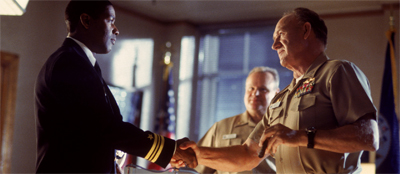
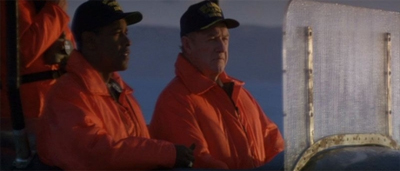
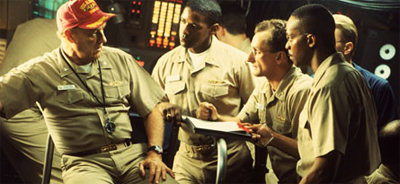
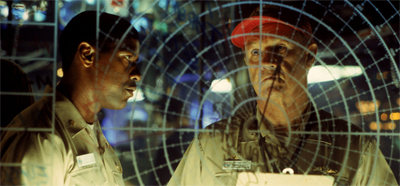
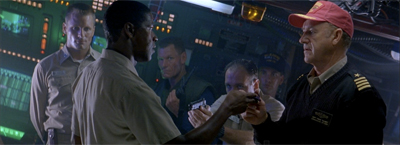





I really love those cold war-set fictional conflict movies like Crimson Tides or the entire Jack Ryan series (The Hunt for Red October, Clear and Present Danger etc…). Indeed a great movie, well before Tony Scott turned into a hack.
I don’t know if I’d go that far. “Hack” seems harsh. But the nineties is where it’s at for Tony Scott.
“Hack” implies Sommers, Bay-esque levels of badness. Tony Scott knows what he wants and doesn’t delve into the unnecessary.
I would deem 360 degree rotating pans around a little control booth in which Denzel Washington is sitting (Taking of Pelham 1 2 3) as unnecessary 😉
I love those Michael Bay rotating pans. Bonus points if the camera is looking up at our heroes and in slow motion.
I’d agree. Which is funny, because Crimson Tide looks like a movie that could descend into a Bay-style mess if pushed a little too far.